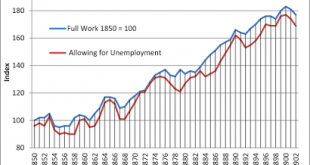Chapter 11 of volume 1 of Capital is called “The Rate and Mass of Surplus-Value” (Marx 1990: 417), and it deals with further aspects of surplus value.In essence, Marx makes a number of points in this chapter as follows: (1) the rate of surplus value is dependent on the duration of the working day and the value of labour-power;(2) the total mass of surplus value can be measured by s/v multiplied by the value of total variable capital, and capitalists wish to maximise the mass of...
Read More »Engels’ Pause: A Cause of Marx and Engels’ Hasty and False Generalisations about Capitalism
The expression “Engels’ Pause” was coined by Robert C. Allen and refers to the period of real wage stagnation or low real wage growth in Britain in the early 19th century from about 1800 to 1840, even when real per capita GDP was rising in an historically unprecedented manner. You can see the “pause” in the graph of historical British real wages and per capita GDP per worker here.First, it is important to note that some economic historians have challenged the data on GDP and real wages in...
Read More »“Socially Necessary Labour Time is the only Source of Value”: What Does this even Mean?
The following proposition is asserted as true by Marxists (e.g., Foley 1986: 16): Proposition 1: Socially necessary labour time is the only source of value. Marx asserted this numerous times, though not necessarily in these words, and here are some examples: “A use-value, or useful article, therefore, has value only because human labour in the abstract has been embodied or materialised in it. How, then, is the magnitude of this value to be measured? Plainly, by the quantity of the...
Read More »Rudolf Hilferding on the Law of Value in Volume 1 of Capital
In 1904, Rudolf Hilferding wrote a response to Böhm-Bawerk (1896) called “Böhm-Bawerk’s Criticism of Marx” (Hilferding 1949 [1904]).In this essay of Hilferding, we have a fascinating confirmation of the way in which the early Marxists were concerned to still vindicate the law of value in volume 1 of Capital – the idea that commodities tend to exchange at pure labour values – as an empirical theory.Like Engels, they seized on Marx’s statement in Chapter 10 of volume 3 of Capital as follows:...
Read More »What are the Useful Insights in Marx’s Capital?
It is not difficult to identity them: (1) the use of a proto-effective demand theory by Marx;(2) endogenous money theory;(3) Marx’s rejection of Say’s law;(4) the notion of a monetary production economy (also developed as a theory by Keynes); and(5) a conflict theory of the distribution of income, and the recognition that workers and capitalists have unequal power. However, the trouble is that none of these insights prove that Marx’s overall theory was right: far from it.There are many...
Read More »Capitalists and Imperialism
The relationship is a favourite of Marxists and even other leftists, and the usual line is: capitalism is inherently imperialistic.But is it? There are different forms of capitalism, and, above all, laissez faire ideology is not monolithic, and it comes in different forms.And it’s rather obvious that some of the most vehement capitalist ideologues are also the most vehemently anti-imperialist. Just think of Murray Rothbard or Ron Paul.For instance, just take Ron Paul’s comments in the videos...
Read More »Marx on Wages in Value, Price and Profit (1865)
Marx’s Value, Price and Profit was a series of lectures he delivered in 1865, even though it was first published in 1898.In this work, Marx has the following to say about the determination of wages in capitalism: (1) “I might answer by a generalization, and say that, as with all other commodities, so with labor, its market price will, in the long run, adapt itself to its value; that, therefore, despite all the ups and downs, and do what he may, the working man will, on an average, only...
Read More »Marx and the “Iron Law of Wages”
This is an interesting point about Marx’s economic theory: he rejected the orthodox Classical “iron law of wages.” Nevertheless, there are still severe problems with Marx’s theory of wages.In essence, the Classical “iron law of wages” was derived from (1) the wage fund theory in Classical economics and (2) Malthusian population theory. The “iron law of wages” was, then, in view of (2) a kind of “law of nature.”By contrast, Marx rejected Malthusian population theory (Baumol 1983: 304, 305),...
Read More »Empirical Studies showing that Prices are Correlated with Labour Costs do not Prove the Classical Marxist Labour Theory of Value!
I can’t count the number of times some absurd apologists for Marxism cite some paper in my comments section showing prices are correlated with labour costs – as if this proves the classical Marxist labour theory of value.It does no such thing. The Marxist labour theory of value says much more than this.In volume 1 of Capital, the “law of value” expounded there was later described by Marx in these terms: “The assumption that the commodities of the various spheres of production are sold at...
Read More »Engels’ Famous Challenge in the Preface to Volume 2 of Capital on the Transformation Problem
In the introduction to volume 2 of Capital written on May 5, 1885, Engels made this famous challenge: “The Ricardian school failed about the year 1830, being unable to solve the riddle of surplus-value. And what was impossible for this school, remained still more insoluble for its successor, vulgar economy. The two points which caused its failure were these:1. Labor: is the measure of value. However, actual labor in its exchange with capital has a lower value than labor embodied in the...
Read More » Heterodox
Heterodox

